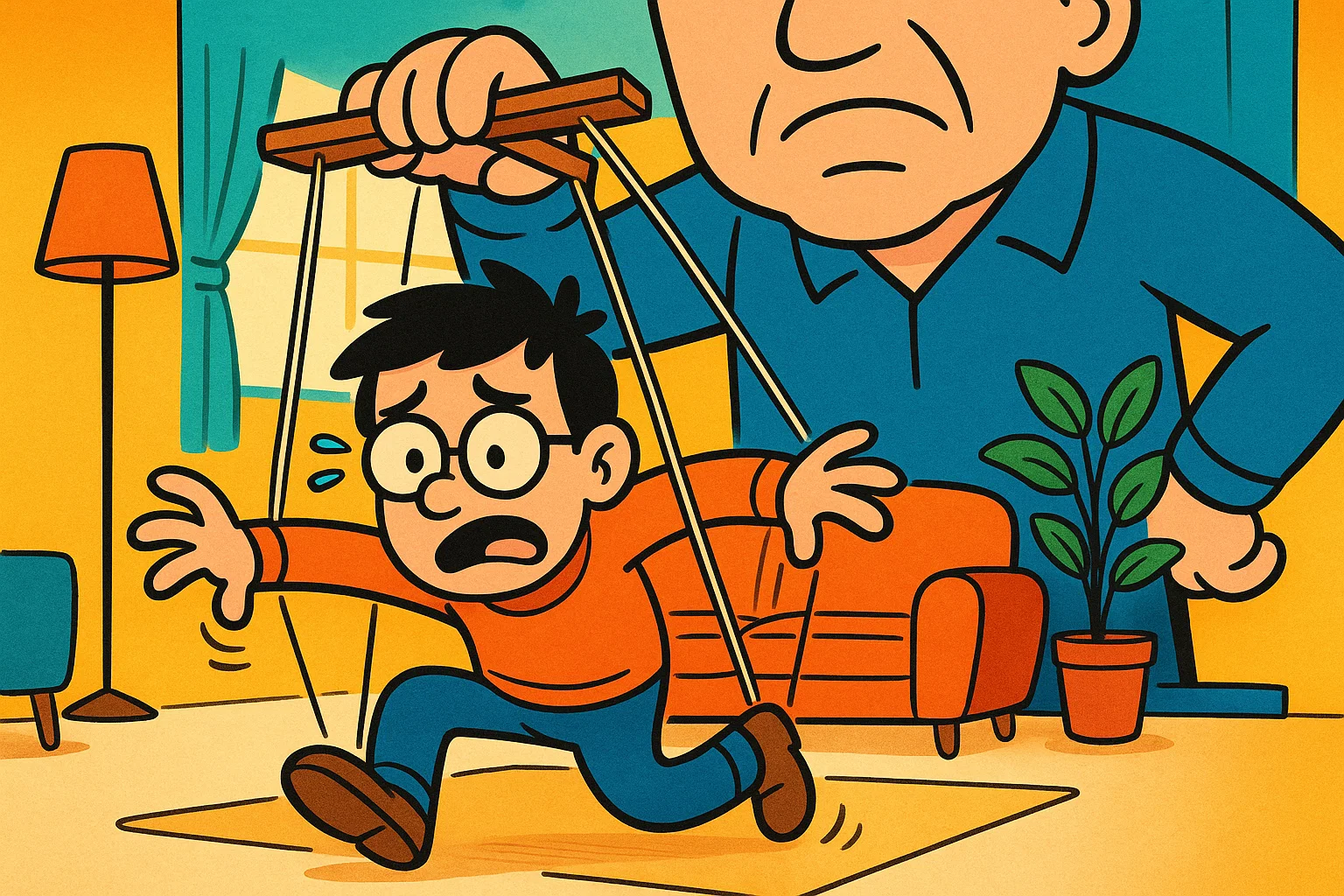Growing up with controlling parents can leave lasting impacts on your emotional development, relationships, and sense of self-worth.
Understanding the signs of controlling parenting behavior is the first step toward healing and creating healthier boundaries. Whether you’re currently dealing with an overbearing parent or recognizing patterns from your childhood, this comprehensive guide will help you identify controlling behaviors and develop strategies for building a more balanced relationship.
Signs Your Parent is Controlling

Recognizing controlling behavior can be challenging, especially when it’s been normalized throughout your upbringing. Controlling parents often believe their actions stem from love and concern, but their methods may actually hinder their child’s emotional development and autonomy.
What is Overbearing Parenting
Overbearing parenting, also known as psychologically controlling parenting, involves excessive involvement in a child’s life that restricts their ability to develop independence and personal autonomy. Unlike authoritative parenting, which provides structure while encouraging growth, controlling parents may use manipulation, guilt, and unrealistic expectations to maintain power over their children.
This parenting style often stems from the parent’s own insecurities, fear of losing control, or unresolved childhood issues. Parents may also believe that strict control equals good parenting, not realizing the long-term emotional distress it can cause.
They Criticize Your Every Choice 😔
Controlling parents frequently criticize their children’s decisions, from minor daily choices to major life decisions. This constant criticism can leave you feeling like nothing you do is ever good enough.
Common signs include:
- Questioning your judgment on simple matters
- Making disparaging comments about your friends, career, or lifestyle choices
- Comparing you unfavorably to others
- Dismissing your opinions or feelings as “wrong” or “immature”
This pattern of criticism can severely impact your sense of self-worth and make it difficult to establish confidence in your own decision-making abilities.
They Have Unrealistic Rules and Expectations
Controlling parents may set strict rules that are inappropriate for your age or circumstances. These expectations might be unattainable, creating a cycle where you constantly feel like you’re failing to meet their standards.
| Age Range | Realistic Expectations | Unrealistic Control |
| Young Adult (18-25) | Respect household rules, contribute to chores | Strict curfews, monitoring all social activities |
| Adult (25+) | Maintain respectful communication | Demanding detailed accounts of daily activities |
| Professional Life | Support career growth | Dictating career choices, controlling finances |
Parents may also enforce rules that don’t account for your growing need for independence, such as demanding to know your whereabouts at all times or restricting your social interactions well into adulthood.
They Constantly Invade Your Personal Space
Respecting boundaries is crucial for healthy relationships, but controlling parents often struggle with this concept. They might believe that being your parent gives them unlimited access to your personal life.
Examples of boundary violations:
- Reading your personal messages or emails without permission
- Entering your room without knocking
- Making decisions about your living space without consultation
- Insisting on being involved in your romantic relationships
- Monitoring your social media activities excessively
This lack of respect for personal space can make it difficult for you to develop a healthy sense of autonomy and privacy.
They Use Guilt or Shame to Manipulate
Emotional manipulation is a hallmark of controlling behavior. Parents may use guilt-tripping, shame, or conditional love to influence your decisions and maintain control over your actions.
Common manipulative tactics include:
- “everything I’ve done for you…”
- Withdrawing affection when you don’t comply with their wishes
- Making you feel guilty for pursuing your own interests
- Using emotional outbursts to get their way
- Threatening to cut contact or support if you don’t conform
This type of psychological control can leave you feeling emotionally confused and questioning your own needs and desires.
They Demand Admiration or Attention
Some controlling parents require constant validation and admiration from their children. They may become upset or vindictive when they don’t receive the level of attention they believe they deserve.
This narcissistic tendency can manifest as:
- Expecting praise for basic parenting responsibilities
- Making your achievements about themselves
- Becoming jealous of your other relationships
- Requiring you to prioritize their needs over your own
They Do Not Respect Your Boundaries 🚫
Boundary violations are perhaps the most telling sign of a controlling parent. When you attempt to set healthy limits, they may respond with anger, guilt-tripping, or dismissal of your needs.
Healthy vs. Controlling Responses:
When you say: “I need some space to think about this decision.”
- Healthy response: “I understand. Take the time you need, and I’m here if you want to talk.”
- Controlling response: “You’re being dramatic. We need to discuss this now, and you know I’m only trying to help.”
They Control You With Money
Financial control is a powerful tool that some parents use to maintain influence over their adult children. This can create a dependency that makes it difficult to establish true independence.
Signs of financial control:
- Making financial support conditional on compliance with their wishes
- Monitoring your spending habits excessively
- Using money as a weapon during disagreements
- Preventing you from gaining financial independence
- Making major financial decisions on your behalf without consultation
Effects of Being Raised by a Controlling Parent

The impact of controlling parenting extends far beyond childhood, often affecting various aspects of adult life including relationships, mental health, and personal development.
Impact on Adult Relationships
Common relationship challenges include:
- Difficulty trusting your own judgment in relationships
- Tendency to seek partners who are either controlling or completely passive
- Struggling with intimacy and vulnerability
- Repeating unhealthy patterns learned in childhood
- Having trouble recognizing red flags in relationships
Many adults from controlling households report feeling like they’re constantly seeking approval from their partners or, conversely, rebelling against any form of guidance or structure in relationships.
Impact on Mental Health
The psychological effects of controlling parenting can be significant and long-lasting. Studies posted on ScienceDirect indicate that adults who experienced psychological control in childhood have higher rates of anxiety, depression, and other mental health challenges.
Mental health impacts may include:
- Chronic anxiety about making decisions
- Depression related to low self-worth
- Difficulty regulating emotions
- Perfectionist tendencies that lead to burnout
- Post-traumatic stress responses to criticism or conflict
Difficulty Making Decisions 🤔
When parents make every decision for their children, those children may struggle to develop decision-making skills. This can result in analysis paralysis or constant second-guessing in adulthood.
Decision-making difficulties often manifest as:
- Overthinking simple choices
- Constantly seeking validation from others
- Fear of making the “wrong” decision
- Avoiding decisions altogether
- Regretting decisions once made
Low Self-Esteem
Constant criticism and control can severely damage a child’s sense of self-worth. Adults who grew up with controlling parents often struggle with imposter syndrome and self-doubt.
Self-esteem issues may include:
- Feeling unworthy of success or happiness
- Comparing yourself constantly to others
- Difficulty accepting compliments
- Harsh internal criticism
- Feeling like you need to earn love and acceptance
People-Pleasing Tendencies
Children of controlling parents often become people-pleasers as a survival mechanism. This pattern can continue into adulthood, making it difficult to prioritize your own needs and desires.
People-pleasing behaviors include:
- Saying yes when you want to say no
- Avoiding conflict at all costs
- Prioritizing others’ needs over your own
- Feeling guilty when setting boundaries
- Having difficulty expressing your true opinions
How to Deal With a Controlling Parent

Breaking free from patterns of control requires patience, strategy, and often professional support. The journey toward establishing healthy boundaries with a controlling parent is challenging but essential for your emotional well-being.
Acknowledge and Accept the Problem
The first step in dealing with a controlling parent is recognizing and accepting that the behavior is problematic. This can be difficult, especially if you’ve been conditioned to believe that their control is normal or comes from a place of love.
Steps for acknowledgment:
- Validate your feelings — Your discomfort with their behavior is legitimate
- Educate yourself — Learn about healthy vs. unhealthy parenting dynamics
- Journal your experiences — Document specific incidents to gain clarity
- Seek outside perspective — Talk to trusted friends or professionals
- Accept that change may be slow — Your parent may not change, but you can
Remember, acknowledging the problem doesn’t mean you love your parent any less or that they’re a bad person. It simply means recognizing that certain behaviors need to change for a healthier relationship.
Establish and Maintain Boundaries ✨
Setting boundaries with a controlling parent is crucial for your mental health and personal development. Boundaries are not walls—they’re guidelines that help create respect and healthy interaction.
Effective boundary-setting strategies:
| Boundary Type | Example | How to Communicate |
| Communication | Limiting discussion of certain topics | “I’ve decided not to discuss my dating life. Let’s talk about something else.” |
| Time | Setting limits on visits or calls | “I’m available to talk on Sunday evenings for about an hour.” |
| Financial | Maintaining financial independence | “I appreciate your offer, but I prefer to handle this expense myself.” |
| Personal Space | Controlling access to your living space | “Please call before coming over, and I’ll let you know if it’s a good time.” |
Tips for maintaining boundaries:
- Be consistent with your limits
- Prepare for pushback and stick to your decisions
- Use calm, clear communication
- Don’t justify or over-explain your boundaries
- Consider consequences for boundary violations
Build an Emotional Support System
Creating a network of supportive relationships is essential when dealing with a controlling parent. This support system can provide perspective, validation, and emotional strength during difficult times.
Components of a strong support system:
- Trusted friends who understand your situation
- Family members who respect your boundaries
- Mental health professionals for guidance and coping strategies
- Support groups with others who have similar experiences
- Mentors or role models who demonstrate healthy relationships
Building these connections takes time, but having people who support your autonomy and independence can be transformative in your healing journey.
How to Stop People-Pleasing
Breaking the people-pleasing cycle requires conscious effort and practice. This behavior often develops as a response to controlling parenting, where compliance was necessary for emotional survival.
Strategies to reduce people-pleasing:
- Practice saying no — Start with small, low-stakes situations
- Identify your own needs — Regularly check in with yourself about what you want and need
- Set time limits — Don’t make decisions immediately when pressured
- Challenge negative self-talk — Notice when you’re being overly critical of yourself
- Celebrate small victories — Acknowledge when you prioritize your own needs
Sample scripts for difficult conversations:
- “I need to think about that and get back to you.”
- “That doesn’t work for me, but I hope you find a solution.”
- “I understand you’re disappointed, but this is what’s best for me right now.”
When to Seek Professional Help
Professional support can be invaluable when dealing with controlling parents, especially if the relationship has caused significant emotional distress or if you’re struggling to establish healthy boundaries.
Consider therapy if you’re experiencing:
- Persistent anxiety or depression
- Difficulty maintaining relationships
- Chronic guilt or shame
- Inability to make decisions independently
- Thoughts of self-harm or substance abuse
Types of therapy that may help:
- Cognitive Behavioral Therapy (CBT) — Helps identify and change negative thought patterns
- Family Therapy — Can improve communication and boundaries (if your parent is willing to participate)
- Trauma-Informed Therapy — Addresses the lasting effects of childhood emotional trauma
- Support Groups — Provides connection with others who have similar experiences
Remember, seeking help is a sign of strength, not weakness. A qualified therapist can help you develop healthy coping strategies and work toward creating the autonomous, fulfilling life you deserve.


